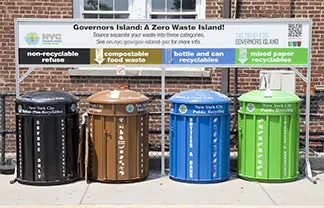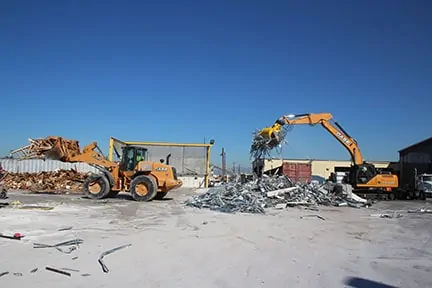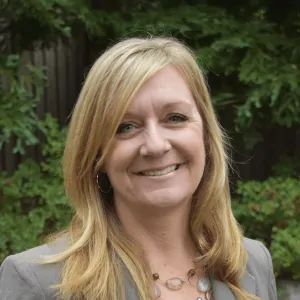

Getting a firm handle on a solid waste operation and expenses is a challenge for any solid waste agency manager or landfill operator. It is particularly imperative in this era of “lean and mean” budgets and looming regulatory policy. Doing more with less is the watchword for most operations across the country still reeling from the financial impacts of the Great Recession.
SCS Engineers has created a package of articles to help you identify if your landfill, landfill gas, or solid waste operation is ready for 2017. We hope this useful guidance will help you plan for the upcoming year. SCS professionals are always available to answer questions and provide advice. Find the office or SCS professional nearest to you by clicking on one the links here: Offices and Professionals.
Download, print or share this package by using the download button under the articles or by using the navigation at left. The package includes the following information written by SCS National Experts:

Read the full article by Marc Rogoff, SCS Engineers.
A solid waste rate analysis will provide your agency with a deeper understanding of how to establish rates and appropriately allocate costs to the various functions of your operation. This financial analysis can also be used to estimate and plan for various contingencies year-by-year.
For example, if your agency would like to buy new collection vehicles or expand your landfill or recycling center, a rate study will allow you to assess how the purchase would impact your current budget. You can then determine if you will have adequate surpluses during the fiscal year to procure these items or if a rate adjustment might be necessary at some point.
Importantly, if the final recommendation of the rate study is a rate increase, you will be armed with information that will strengthen your case when requesting a fee increase.
Read and share this newly published article by Marc J. Rogoff, Ph.D., and Laurel Urena, M.S., E.I.T., of SCS Engineers. Learn more about this valuable service at SCS Engineers and see how others are using rate analysis.
Read and share the full article
Learn more about Rate Analysis
Read how one organization used rate analysis as part of their solid waste master plan
“This program directly supports the county’s Roadmap to a Sustainable Waste Management Future by helping businesses to implement recycling programs,” says Leonard. “And not only recycling but waste reduction, as well, all of which, of course, contribute to reducing greenhouse gas emissions, resource management and sustainable materials management.”
Read the article about L.A. County’s Plan for Sustainable Waste Management
SCS periodically prepares technical bulletins to highlight items of interest to our clients and friends. These are published on our website. This SCS Technical Bulletin addresses:
Read and share the SCS Technical Bulletin here.
SCS Coal Combustion Residual Services

Construction and Demolition Recycling Inc. is a California state certified C&D recycling facility which handles debris from the renovation, construction, and demolition of commercial interior spaces. CDR is the only facility in California that accepts only commercial interior debris, and the only facility in the country that can show a better than 80% diversion rate of these materials traditionally buried in landfills.
CDR’s staff also salvages usable items such as furniture, desks, chairs, file cabinets, and more, for reuse, donating more than 50 tons of these materials every month to not-for-profit agencies and other organizations. All of this allows CDR to divert over 80% of all inbound debris from landfills, a diversion rate that has been third party-verified by the Recycling Certification Institute.
The CDR facility in South Gate, California is a fully permitted C&D/inert debris processing and transfer facility. The facility is owned and operated by Interior Removal Specialist, Inc. (IRS), a demolition company that conducts demolition activities primarily of the interior of offices and other commercial buildings. Construction and Demolition Recycling Incorporated’s goal is to lead by example; showing that the diversion of tenant improvement demolition debris can be accomplished as efficiently and cost effectively as the debris from more traditionally recognized demolition debris. CDR has become the first and so far only recycling facility in Southern California that has earned Third Party Diversion Certification from The Recycling Certification Institute, making CDR the only facility in Southern California that is eligible to provide the US Green Building Council LEED Pilot Point for facilities with 3rd party verification.
Read the full article to learn some of the innovative strategies of this successful recycling company in “Construction and Demolition Debris Recycling Program; How CDR was Conceived and How CDR Remains Sustainable.”
Solid Waste Management, Sustainability, and Recycling Programs
By following the simple procedures governing selective routing in the commercial space, it is possible to turn a high disposal garbage collection system into a high diversion recycling system, without incurring additional costs or losing collection revenue. Read more…
Tracie Onstad Bills of SCS Engineers and Richard Gertman of For Sustainability Too explain the steps for commercial-stream routing and management of commercial recyclables with remarkable results in their Resource Recycling article published in June 2016.
Questions? Ask Tracie, she writes a blog series about recycling.
Tracie Onstad Bills, Northern California Director, Sustainable Materials Management at SCS Engineers
Thank you for the responses and questions about my blog Minimizing Contamination in Recycling. It seems appropriate to provide answers to the most frequently asked questions and send more advice. Any program should be tailored to your current collection system; what works and what doesn’t work for your locality; the demographics of your community; and how your community views recycling.
In light of those considerations, here are some recommendations for ways to minimize contamination in recyclables:
Learn more about recycling programs by reading Success In Selective Routing – Resource Recycling or the SCS project and case studies below:
As always, feel free to send me your questions and comments. Contact Tracie here.
SCS Engineers’ Tracie Onstad Bills and Leslie Lukacs were both selected to receive the California Resource Recovery Association’s (CRRA) prestigious Service Award this year. According to CRRA Executive Director, John H. Dane, the award recognizes “exceptional individual service to the organization and a contribution of time or resources beyond expectations.” That sounds like an SCSer alright.

Tracie Bills is SCS’s Sustainable Materials Management Director and is based in our Pleasanton, CA, location. She has been on the CRRA board for 10 years and has served in several leadership positions within the organization, including as its President for three years. Her expertise revolves around commercial recycling technical assistance, environmental purchasing, large venue and event zero waste programs, research and sustainability planning, garbage hauler franchise compliance and review, construction and demolition program / ordinance analysis and writing, climate inventory compilation, research and feasibility studies to help clients with comprehensive waste prevention and zero waste programs.
Leslie Lukacs serves as a Sustainable Materials Management Specialist in our Santa Rosa, CA, office. She has been on the CRRA board for 12 years and also served in a variety of leadership positions. She also founded CRRA’s Green Initiatives for Venues and Events technical council and was an instructor for CRRA’s Resource Management Certification Program for 5 years. Leslie specializes in the design and implementation of sustainable materials management and zero waste programs and is a pioneer in the greening of venues and events throughout the nation. Her extensive expertise in the logistics of zero waste, recycling, and composting programs, such as outreach management, business assistance, master planning, waste audits and characterization studies, extended producer responsibility ordinance preparation and implementation, compliance, grant writing, and administration are all key to successful long-term programs.
Both women were selected by the CRRA Board of Directors to be the 2016 recipients of the Service Award. The awards will be presented at the organization’s Annual Conference Awards Ceremony on August 9 in Sacramento.
CRRA is California’s statewide recycling association. It is the oldest and one of the largest non-profit recycling organizations in the U.S. CRRA is dedicated to achieving environmental sustainability in and beyond the state through Zero Waste strategies including product stewardship, waste prevention, reuse, recycling and composting. The organization provides its members with resources to advance local, regional and statewide waste reduction efforts which result in critical environmental and climate protection outcomes. Members represent all aspects of California’s reduce-reuse-recycle-compost economy and work for cities, counties, municipal districts, and businesses as well as hauling companies, material processors, non-profit organizations, state agencies, and allied professionals.
This innovative sustainable materials management approach involves strategically picking up loads from businesses that generate similar types of discards. The linked article discusses the approach of following simple procedures governing selective routing in the commercial space.
Using a phased methodology, it is possible to turn a high-disposal garbage collection system into a high-diversion recycling system, without incurring additional costs or losing collection revenue. Dumpsters behind shopping plazas and other sites can become opportunities at the center of a thriving materials recovery program.
About the Authors:
Richard Gertman is the owner of For Sustainability Too in San Jose, CA.
Tracie Onstad Bills has been in the Environmental and Resource Material Management Field for over 20 years. Her expertise revolves around commercial recycling technical assistance, environmental purchasing, large venue and event zero waste programs, research and sustainability planning, garbage hauler franchise compliance and review, construction and demolition program / ordinance analysis and writing, climate inventory compilation, research and feasibility studies to help clients with comprehensive waste prevention and zero waste programs. Ms. Bills has a BA in Environmental Science from San Jose State University, is a CRRA Board member and belongs to the SWANA Gold Rush Chapter, National Recycling Coalition and the Northern California Recycling Association. Contact Tracie here.